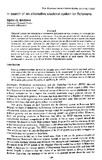| dc.contributor.author | Molomo, M.G. | |
| dc.date.accessioned | 2011-10-17T13:26:20Z | |
| dc.date.available | 2011-10-17T13:26:20Z | |
| dc.date.issued | 2000 | |
| dc.identifier.citation | Molomo, M.G. (2000) In search of an alternative electoral system for Botswana, Pula: Botswana Journal of African Studies, Vol.14, No. 1, pp.109-121 | en_US |
| dc.identifier.uri | http://hdl.handle.net/10311/900 | |
| dc.description.abstract | Electoral systems are manipulative instruments that determine how elections are won and lost.
Botswana is widely regarded as a frontrunner in democratic politics, but the electoral system
that it operates has been wanting in some respects. Tthe First-past-the-post system has helped
to consolidate democratic practice, and also provides for an effective link between Members of
Parliament and their constituencies, but empirical evidence suggests that it is the least democratic electoral system. Its winner-take-all practic distorts electoral outcomes, and often produces minority governments. The article proceeds to discuss proportional representation
(PR) and semi-proportional representation, and outlines their strengths and weaknesses. The
paper concludes that since both the FPTP system and PR systems have inherent limitations, the
best system would be one that draws on the best aspects of each system. The anicle recommends a variation of the Mixed-Member Proportionality system. | en_US |
| dc.language.iso | en | en_US |
| dc.publisher | Pula: Botswana Journal of African Studies | en_US |
| dc.subject | Elections Botswana | en_US |
| dc.subject.lcsh | Elections--Botswana | en_US |
| dc.title | In search of an alternative electoral system for Botswana | en_US |
| dc.type | Published Article | en_US |
| dc.link | http://archive.lib.msu.edu/DMC/African%20Journals/pdfs/PULA/pula014001/pula014001012.pdf | en_US |

